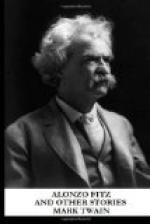At length, when it was sunset in San Francisco, and three hours and a half after dark in Eastport, an answer to the oft-repeated cry of “Rosannah!”
But, alas, it was Aunt Susan’s voice that spake. She said:
“I have been out all day; just got in. I will go and find her.”
The watchers waited two minutes—five minutes—ten minutes. Then came these fatal words, in a frightened tone:
“She is gone, and her baggage with her. To visit another friend, she told the servants. But I found this note on the table in her room. Listen: ’I am gone; seek not to trace me out; my heart is broken; you will never see me more. Tell him I shall always think of him when I sing my poor “Sweet By-and-by,” but never of the unkind words he said about it.’ That is her note. Alonzo, Alonzo, what does it mean? What has happened?”
But Alonzo sat white and cold as the dead. His mother threw back the velvet curtains and opened a window. The cold air refreshed the sufferer, and he told his aunt his dismal story. Meantime his mother was inspecting a card which had disclosed itself upon the floor when she cast the curtains back. It read, “Mr. Sidney Algernon Burley, San Francisco.”
“The miscreant!” shouted Alonzo, and rushed forth to seek the false Reverend and destroy him; for the card explained everything, since in the course of the lovers’ mutual confessions they had told each other all about all the sweethearts they had ever had, and thrown no end of mud at their failings and foibles for lovers always do that. It has a fascination that ranks next after billing and cooing.
IV
During the next two months many things happened. It had early transpired that Rosannah, poor suffering orphan, had neither returned to her grandmother in Portland, Oregon, nor sent any word to her save a duplicate of the woeful note she had left in the mansion on Telegraph Hill. Whosoever was sheltering her—if she was still alive—had been persuaded not to betray her whereabouts, without doubt; for all efforts to find trace of her had failed.
Did Alonzo give her up? Not he. He said to himself, “She will sing that sweet song when she is sad; I shall find her.” So he took his carpet-sack and a portable telephone, and shook the snow of his native city from his arctics, and went forth into the world. He wandered far and wide and in many states. Time and again, strangers were astounded to see a wasted, pale, and woe-worn man laboriously climb a telegraph-pole in wintry and lonely places, perch sadly there an hour, with his ear at a little box, then come sighing down, and wander wearily away. Sometimes they shot at him, as peasants do at aeronauts, thinking him mad and dangerous. Thus his clothes were much shredded by bullets and his person grievously lacerated. But he bore it all patiently.
In the beginning of his pilgrimage he used often to say, “Ah, if I could but hear the ’Sweet By-and-by’!” But toward the end of it he used to shed tears of anguish and say, “Ah, if I could but hear something else!”




